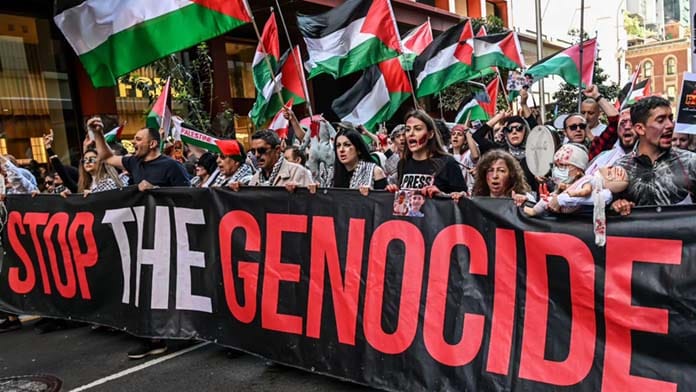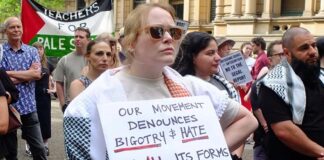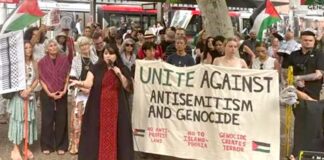David Glanz looks at what the movement for Palestine has achieved in the last year and how it can move forward
Within hours of Israel launching its murderous assault on Gaza, thousands began taking to the streets for Palestine. In Sydney, the first snap rally was on 9 October, with Melbourne on the streets the following day.
Then on 15 October came the first of more than 50 weekly Sunday rallies. From the beginning they were the largest protests for Palestine ever seen—and for the first few months they just got bigger.
With protests spreading to every capital and many regional centres, at least a quarter of a million people across Australia have marched for Palestine. In Sydney, protest numbers were so large that police abandoned their effort to ban rallies.
The mass movement put down roots in communities, workplaces and campuses.
In Melbourne, hundreds of Palestine supporters rallied outside local councils to encourage support for Palestine. Seven councils voted to show solidarity and fly the Palestinian flag.
People around the country protested outside the offices of federal Labor MPs, with an encampment outside Anthony Albanese’s electorate office in the Sydney suburb of Marrickville running for months.
There were protests and pickets outside factories manufacturing parts for the F-35 jet fighter, one of Israel’s main weapons in Gaza.
Picket lines
Importantly, workers organised in their workplaces and unions, despite their officials often being slow or reluctant to respond.
Rank-and-file groups were launched in most unions and, under pressure from their members and the movement, some officials began to authorise contingents at the Sunday rallies.
Israeli-owned ZIM ships were disrupted on the Sydney, Fremantle and Melbourne waterfronts as members of the Maritime Union of Australia respected community picket lines.
In Melbourne, members of the Australian Services Union took unprotected industrial action in February in solidarity with Palestine, with workers at community legal centres and social and community service workplaces walking off the job.
The CFMEU was among the first unions to take a clear stand for Palestine, calling for the Albanese government to ban military trade with Israel, including dual-use devices.
The ACTU held back because of its loyalty to Labor but under pressure from the movement and some affiliated unions made three statements: in October 2023 calling for a ceasefire and end to the occupation of Palestine; in February calling for the recognition of Palestine; and most importantly, in April demanding an end to all military trade with Israel and sanctions on selected Israeli officials.
Months of patient arguing by teacher and school staff activists in Victoria paid off with the Australian Education Union conference in July voting for an unprecedented pro-Palestine position.
Delegates demanded an end to the occupation and illegal settlements and supported an AEU contingent at a Sunday rally each month.
The sacking of Antoinette Lattouf at the ABC and other high-profile attempts to repress workers have generated outrage and opportunities for collective resistance.
In NSW, teachers have successfully forced a departmental “review” into directives effectively banning Palestine solidarity symbols.
Encampments
Inspired by the solidarity encampments that students had set up on campuses across the US, students at most capital city universities moved into action.
Encampments were established at universities including ANU, RMIT, Deakin, Monash, La Trobe, Sydney Uni, Queensland Uni, Adelaide Uni and Curtin. At one point, when the ANU encampment came under management attack, members of the CFMEU working on campus walked off the job in solidarity.
At the University of Melbourne, the encampment ran for four weeks, culminating in a weeklong occupation of a building dubbed Mahmoud’s Hall in honour of a Palestinian student killed in Gaza.
When university management threatened the students, the National Tertiary Education Union branch called on members to support the occupation.
University management cracked and agreed to the first of the students’ demands—to disclose the university’s links with weapons manufacturers.
Students at Curtin, ANU and the University of Sydney were among those who won similar partial concessions. Students now face the task of holding universities to their word.
Importantly, students beat back attempts at many universities to discipline or even expel them. With hundreds rallying in defiance, managements either dismissed the charges or imposed no penalties.
Weapons exports
The Albanese government has tried to cover its unwavering material and political support for Israel several times over the past year.
It broke with its ally in Washington and voted in the United Nations in December for a ceasefire. Last month, it abstained on another UN resolution, one the US opposed.
But hiding in plain sight are the defence MoUs, the trade offices in Tel Aviv, the government funding for Israeli weapons companies and Australia’s fervent support as a key player in the US alliance. The movement needs to demand more forcefully that Australia cut all diplomatic, trade and military relations with Israel.
It cannot be left to the committed minority in the movement to understand the depth of our rulers’ support for genocide. And many in the movement are still not clear about the kind of mass social power we need to mobilise to cut these ties.
As we move into the second year of genocide, the Palestine solidarity movement is building from an unprecedented base of support.
But some of the momentum generated in the first few months is in danger of dissipating. The movement needs to put far more focus on campaigning to widen its support.
The weekly rallies are now substantially smaller. Partly that’s a result of exhaustion—but it also reflects a lack of strategy, which means the rallies are not seen as opportunities to give the movement direction and help launch campaigning initiatives.
The movement has also sustained damage because some Palestine supporters have seen attacking supportive union officials or Labor members as the way forward.
In Melbourne, for example, some activists maintained an aggressive picket on the waterfront after MUA members were forced to return to work after four days of respecting a community picket line. The result was a breakdown between the MUA and the pro-Palestine movement.
Other activists invaded the Victorian state Labor conference, denouncing all Labor members as complicit in the genocide—an action that precipitated a terminal crisis in Unionists for Palestine.
Rebuild
As Israel launches fresh horrors on Lebanon while refusing a ceasefire in Gaza, the movement for Palestinian liberation will continue.
One priority now is to rebuild the city rallies—holding them less frequently but promoting them by reaching out to workplaces, campuses and communities with mass leafletting, union meetings and Palestinian speakers.
Another is to use the official backing of the ACTU and individual unions to build deeper support for Palestine among workers as a first step towards eventually stopping work to stop the war.
Israel’s horrors are not stopping. Neither can we.






